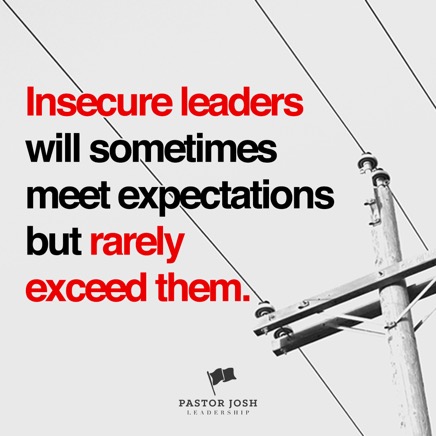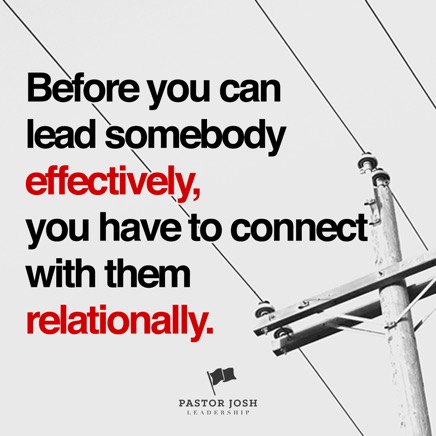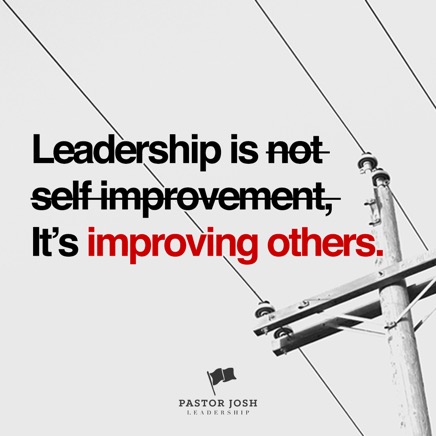




The following is a lesson that didn’t make it to the final draft of my book, Simple Leadership. I am putting it here to serve as a sample of what the 30 lessons in the book are like. I’d be super honored if you picked up a copy for yourself or a friend.



You may have heard it said, “Don’t follow me, follow Jesus.” It sounds spiritual, and I believe people are very well intended when they say it. What if I told you the Bible doesn’t teach that. In fact, the great commission was established by the concept of influencing people because Christ has influenced us. (Matthew 28:19) We can only make disciples through influencing others! Paul made this statement “Follow my example, as I follow the example of Christ.” 1 Corinthians 11:1 (NIV) The New King James vision uses the word “imitate.” Wow. What a statement, what a standard.
Influence isn’t free, it has a cost. Impact can happen….

One of the deep cries in our culture is the need for authentic, real, genuine relationships. I love that social media allows me to be able to see how—and what—my friends are doing. I like to see what has transpired in their lives since the last time I saw them in person. However, the human need for authentic relationships is not met by how many social media friends I have, or by how many likes or comments I can generate on my latest post. Social media is a great supplement for human connection, but it cannot replace physical interaction. We are all designed for and want human connection, a connection with skin on, and you can’t fulfill that desire on a screen.
One thing you don’t normally see on the highlight reel of a social media timeline is vulnerability. Just a few moments ago I took 4 pictures of my coffee and spent probably 3 minutes working on the staging of that pic. Why? Perhaps I think that if I get the perfect angle or add the perfect filter, I can generate more likes and enjoy the 30 seconds of delight that it gives me. My life is not enhanced by that at all.
Last weekend I shared at a men’s breakfast with about 10 men. I shared a short message, then got really vulnerable and real with them about my journey. My heart was stirred, theirs was as well. There is something about sitting across them sharing the ups and downs of my walk. The equity I get from my post fails in comparison to the conversations at the breakfast. Vulnerability opens the door to the heart.
Here are a few thoughts on vulnerability:
1. Vulnerability is not emotional vomit.
Gossiping, complaining, and griping is not vulnerability. They are sins. There is a grave difference between describing another persons behaviors and talking about your feelings and the tensions you are dealing with. I can’t tell you how many times I’ve heard people justify gossip under the banner of “I’m just being real.” Maybe what you need to do is deal with the bitterness in your heart and be more self-controlled? Being vulnerable is about “you” not somebody else.
2. Transparency is sacred.
We all have issues. I don’t tell everybody everything, nor should you. There are things my wife knows about me that nobody else does. She is the only one who should know those things. If I tell everybody everything, then there is nothing sacred about my trust or my transparency. You need to develop trust before you share the deepest parts of your life. The more we trust, the more we share. As a rule, I only share deep things with people that can help me with deep things. We must have these people in our life. We were never meant to carry the weight alone.
3. Be real, and let them be too.
I’ve found that when I am authentic with people, it reciprocates.
When we are wrestling with an issue and we go to somebody about it, we are going for help. Sometimes believers are quick to impose the standard and not offer a hand to help. This is one of the issues we see with Jesus and the religious leaders. In most cases, Jesus had the same standard as the religious. The difference was that Jesus helped the person through the issue. Jesus didn’t point to the standard and tell the hurting to reach it, he lifted them to it. (See John 8:1-11)
When we don’t let people be real we force them to be fake.
Being vulnerable is important. Knowing the difference in when and whom to share with is vital. When we are able to open up in areas that we are hiding due to shame, we will start to get freedom in that area. Be prepared: to be vulnerable where you need to be, and gracious when someone deems you the person they see fit to be vulnerable with.
[if you have this time this is a powerful video a Ted Talk on The Power of Vulnerability by Brene Brown]



“He appointed twelve that they might be with him and that he might send them out to preach” -Mark 3:14 NIV
The disciples were there with Jesus, partnering with Him. They gathered crowds, passed out food, advanced the message, and they even performed miracles. (Mark 6:13)
The disciples even took over and grew the ministry of Jesus after He left the planet.
(To the disciples he said) “Whoever believes in me will do the works I have been doing, and they will do even greater things than these, because I am going to the Father.- John 14:12(NIV)
Jesus established a model and partners to advance His purposes, when He walked the Earth. It’s the greatest leadership strategy that the world has ever known. He didn’t just disciple followers, He discipled leaders!
If we are followers of Jesus, He wants us to emulate this model.
Leadership is often viewed as “be the best that you can be,” but what if we saw leadership as empowering others to be the best that they can be. Self improvement is critical, but leadership is not self improvement, it’s improving others. Leadership is not education, it’s impartation, imparting and empowering others to fulfill a greater purpose.
"Leadership is not self improvement,
It’s improving others."
In the end, our greatness will not be measured by what we do with what is in our hands, but what we put in the hands of others.
The Process of Empowering Others
"Before you will ever lead somebody effectively,
you will have to connect with them relationally."
2. Show Them
Showing somebody how to do something can be difficult and time consuming sometimes. It can be true that many times it’s “easier (and even better) if I do it myself.” But if I continue to do it myself, then somebody else doesn't get to do it. It’s actually selfish.
Developing people takes time, but is aways more important than accomplishing tasks! Take the extra time to develop somebody to do what you are doing, and you might be surprised in the short amount of time that they are doing it better than you ever could!
Developing people > Accomplishing task.
3. Grow Them
Jesus spent way more time with His disciples than He did with the crowd. Much of what we read in the gospels are resourcing moments where Jesus was growing his disciples.
Resourcing and encouraging those who are around you is your responsibility as a leader. Whether it be an article, blog, video, a message, or something you generate yourself, it is the leader’s job to be the equipment manager of the people they are developing.
4. Let Go of Them
I heard years ago that if somebody can do what I am doing 80% as good as I can, then I should give it to them.
This is a struggle for me. I am a hands on leader. I am also very particular. (All of the people close to me said “Amen!”) This can be a problem because if I am not careful, I will micromanage what I hand off. It can cause those that I impart to to operate out of fear and become insecure. Insecure leaders will sometimes meet expectations but rarely exceed them. In order for people to get better, they have to be able to set expectations for themselves rather than living under the scrutiny of the person delegating to them.
"Insecure leaders will sometimes meet expectations
but rarely exceed them."




For though the righteous fall seven times, they rise again.
- Proverbs 24:16(NIV)
That is what we do. We get up. We rise from the ashes. We are not one hit wonders. As leaders, the greatest stories we use to inspire others are the redemption stories of when we were low, and we were able to gain ground.
3 Things to Remember to Help Get You Back Up:
1. Grace
Sometimes it is easy to have grace for others but not for ourselves. In fact, in my life, I have found that when I don’t have an understanding grace for myself I am not very graceful towards others. Take it easy on yourself! Grace empowers the second chance. Grace doesn't simply show pity when we are down, it empowers us to get up!
" Grace empowers
the second chance."
2. Reach Out
There will be moments in our lives where the only way we can get up is with the assistance of another. Everybody needs a hand. God has placed people in your life to help you when you are down.
Ecclesiastes 4:9-10 (NIV) Two are better than one, because they have a good return for their labor: 10 If either of them falls down, one can help the other up. But pity anyone who falls and has no one to help them up.
3. One More Time
It is critical to remember that you only have to get up one more time than you fall. When you are down, just declare the words, “just one more time.”
Micah 7:8 (NIV) Do not gloat over me, my enemy! Though I have fallen, I will rise. Though I sit in darkness, the LORD will be my light.

"Substance doesn't come from copying a model.
Substance is born in the heart."
I don't want to seem dramatic, but I think at times we border on idolatry. Making people that inspire us the goal, and not what God has called us to do. It's hard to resist. As an artist I get it. As a public speaker I get it.
Let me be clear there is nothing wrong with repeating what another person says, or following a trend. However, it is imperative that when we are being an echo, that we don't lose our own voice. Go ahead with some retweets, but don’t let your life be a retweet of somebody else’s timeline.
"Don’t let your life be a retweet
of somebody else’s timeline."
3. Embrace Creativity
Believers should be the most creative force on the earth! You were made in the image of God! You are creative. Look inward and stop focusing so much on what others are doing. Comparison is killing your ability to create. Comparison screams be more like _____. However, God is raising up ground breakers and pioneers. Will you be willing to dream with The Creative One? Get alone, disconnect from technology, and dream with God!
4. Embrace Principles
I have spent most of my time in this blog trying to break a mold, but principles are important to remember. There are right and wrong ways to be original. The most virtuous and the greatest evil in human history all started with an idea. The noble follow noble principles. They color inside the lines, but they use different colors. As a follower of Christ, don't try to redefine virtue. As it’s been said, “The method changes but not the message.” The principles are given by your Creator.
5. Release Passion
What burns inside of you? Discover your “why” and give yourself over to it. It might not become the greatest trend, but the only way you will ever influence the masses is by influencing the one. The only way you can influence one is by pouring out yourself on what you do. Let it out. It’s inside of you. Do, be, and create all that God has put in your heart!

Over the past several years, sloths have become a bit iconic. From memes to animated movies, they have become a visual staple in our culture. Whether it's Monday or a lazy weekend, sometimes our pace can be illustrated by the lethargic beast that sleeps 15-20 hours everyday that gets in a hurry for nothing. The Bible does not really talk about sloths but scripture talks a lot about the slothful.
Scripture uses several words to communicate the concept of slothfulness: sluggish, lazy, idle, slow, indifferent, careless. It's a deeper issue than simply not wanting to get out of bed in the morning.
Throughout the Bible and heavily throughout the book of Proverbs, we see warnings of this behavior because it can lead to debt(Prov 12:24), poverty(Prov 13:4) and even destruction(Prov 21:21). In Biblical culture laziness was no joke to be laughed at. It was very frowned upon, considered one of the lowest forms of behavior. Historically in the church and society slothfulness made the list of the 7 deadly sins. It's kind of a big deal.
We need to have days of rest, God commands it even. However, our mode in life should be that of diligence if we want to be successful and live a life that honors God.
Romans 12:11 (NIV) Never be lacking in zeal, but keep your spiritual fervor, serving the Lord.
Other translations state to it this way: Never be lazy, but work hard(NLT)In diligence not Slothfull.(ASV)
The greek root word is Okneo: meaning (1) to feel loath, to be slow (2) to delay, hesitate.
Spiritually we can become slothful- that is slow and indifferent. We become lazy, lose our fire, and we just coast. We figure just as long as we are not sinning as much as we used to that we are doing well. Stagnation in our walk can be just as detrimental as drifting. I want to ask you today, what does your spiritual diligence look like? Have you become slow in your pursuit of Jesus and his kingdom? Has your relationship with him grown mild? Have you became slothful in spirit? Have you lost your fire? If so, get it back! Return to your first love, your first passion and get it back! (Rev 2:4)
We are not called to just be spiritually diligent we are called to a life of diligence. What does diligence look like in your life? Are you slothful? I know a lot of us are naturally sloths. I get it, I’ve been there and have had to fight hard for a lot of years and lay down my tendency. I grew up in a blue color town and my dad modeled an incredible work ethic. Even in that environment, I had to fight the tendency to become slothful.
Slothfulness can be demonstrated in our lives in several ways:
1. Carelessness/ Apathy:
A lot of times it's just a heart issue. We simply don't care. If that is the case it simply ends there. If you are dealing with being apathetic every day, for as long as it takes get before Jesus daily and ask him to reignite your heart.
2. Consistently running late:
Most of us will be late occasionally. Things happen. Being late for things is very inconsiderate of people that are waiting on you. Being late tells other people that we do not value their time. It’s inconsiderate. Value people's time and make being on time a priority, it will speak well of you!
3. Procrastination:
Procrastinating is not always about laziness but it’s about priorities. We will do what we find most important first. Don't wait till tomorrow to stop procrastinating. ;)
4. Failing follow through
It is critical as believers, and especially leaders, that we follow through with our commitment. When we don't follow through with what we say, it's essentially saying, “I have no integrity.” Be a person of your word. Your testimony and your reputation hinge upon it.
Follow through is a responsibility issue. Responsibility is not just the measure of maturity, it's the sustainer of our credibility.
Don’t overcommit, don’t oversell. There is a difference between what you can do and what you actually will do. Make sure that your commitment is not what you intend to do but what you actually will do.
"Responsibility is not just the measure of maturity,
it's the sustainer of our credibility."
5. Lack of motivation:
I believe for most people slothfulness is a motivation issue. Whether you fell like doing it or you don't feel like doing it, if you do it the outcome is the same. Sometimes you only feel like doing it when you are doing it.
I love mowing the lawn. I enjoy being outside, the smell, the heat, the monotony of it. It's very therapeutic to me. However, I always dread mowing the lawn until I am mowing the lawn. Sometimes you just have to allow discipline to do the driving and allow the heart to follow.
Hebrews 6:10-12 (NIV) 10 God is not unjust; he will not forget your work and the love you have shown him as you have helped his people and continue to help them. 11 We want each of you to show this same diligence to the very end, in order to make your hope sure. 12 We do not want you to become lazy, but to imitate those who through faith and patience inherit what has been promised.

There is a guy I see at the gym most days. He is probably in his 60’s, doesn't smile much, nor does he talk to other gym goers. I imagine him as a man that has worked hard his entire life. He is rugged and strong. Often times I see him on the bike or at the arm curl machine grinding out his workout. What fascinates me most about this man is that he does not have the typical attire of a gym goer. He wears athletic shoes, a trucker hat, a t-shirt, and jeans. Yes, he exercises every day in jeans. He works out hard wearing Wranglers with a long wallet sticking out of his back pocket. I also don’t imagine that he drinks Starbucks and is probably more likely to drink the canned Folders that is brewed for free at the gym. He doesn't have the look but he has the lifestyle. He shows up.
There are these ladies that frequent the Starbucks where I spend my Tuesday mornings. They order a skinny vanilla late and wear t-shirts, yoga pants, Nike caps, and athletic shoes along with pristine makeup. Their makeup looks so untouched most likely because they aren’t working out. They have the look, but they don't have the lifestyle. It's just fashionable.
I feel like this is how a lot of people are. They have the look but they don't have the lifestyle. Rather than focussing on the work, they focus on the look. In the highlight reel of the digital age, we show people the best moments of our lives. We give them our fashion, but do we backup the lifestyle? We keep most people at a screens distance, so naturally we live in a extremely sensitive and insecure culture.
Leadership has become fashionable. It’s trendy to use quotes, attend conferences, and hold titles. All leaders need to be students of leadership, but it’s one thing to be a student of leadership and it’s another to actually lead. We love the idea of influencing others, but it takes time and energy. It takes work. A lot of work. We can’t just carry the title, we have to show up.
Nobody likes hypocrisy. It’s not a new concept. Even Jesus hated it. The word hypocrisy is taken from the Greek term for “actor” and literally means “one who wears a mask”. (Ancient Greek actors wore masks during their performances.) So the true meaning of a hypocrite is someone who pretends to be what he is not. Now before you jump to the conclusion, I am not saying that yoga pant moms are hypocrites. My point here is that it does none of us any good to go around acting and putting on the garments if we are just playing dress up and pretending. Putting on a show.
Three easy ways to quit pretending:
1. Just be real
Be honest, and by being honest I don't mean that you announce your sin to the world with a megaphone. Stop feeling the need to cover up. It’s sad that a common term in our culture is “honestly” or “To be honest.” #TBH I mean, shouldn't we always be honest? Now, Self-Control is a fruit of the spirit that we should exercise regularly, but with people that we are living life with, we should let them know the real us- not the fake us.
“People would rather follow a leader who is always REAL than one who is alway RIGHT.” -Craig Groeschel
2. Show up
Our life and leadership will never produce if we only live based upon how we are feeling. There can be a great difference in how you feel and what you do. We must lead our heart if we want to experience life at the fullest.
One day at the gym, I noticed something about the man in jeans. He had a cane. I don’t know if he had it all the time but that day I noticed it. If I needed a cane I would skip the gym. But not this guy, he is the real deal. He doesn't make excuses, he doesn't let the pain keep him at home. He works out. It’s what he does.
On our best day or our worst day we show up. We are not being fake, we are being faithful.
"On our best day or our worst day we show up.
We are not being fake, we are being faithful."
3. Stay at it
Consistency is what defines us. It’s not our highlights nor our moment of weakness that reveals who we are. What we are made of is revealed throughout the seasons of our lives. Faithfulness ceases when we fail to be faithful, and fruitfulness is the result of being faithful. So stay at it! You are becoming the person and the leader that God has designed you to be. You can’t get results with out the hard work. Your job is to keep going and allow God to take care of your promotion.

One of my favorite things about my years spent in student ministry is the culture that was built. There were many fond moments as lives were being shaped and molded! One of the most fun things that came out of developing our culture were little “isms” that are formed. Part of the culture we developed was hard work. We would tirelessly hustle to get things done and often we found creative ways to problem solve. A term that we often used and lived by in those days was “Don’t tell me the problem tell me solution.” You see, I had trained our student leaders that they were not allowed to tell me about a problem until they tried several ways to solve it. If they came to me with a problem I would simply ask what they did to figure it out, or I would ask what they had tried. As stern as it may have sounded, rather than bailing them out, I taught them how to problem solve. Today some of those students are some of the most competent adults I know.
Problem solving is one of the most important aspects of leadership. Often times we will have to know how to find quick, innovative, quality solutions. Here are few things that will help you grow in solving problems.
“Don’t tell me the problem
tell me solution.”
5 Ways to Grow Problem Solving Skills
1. Grow in Discernment.
When God allows you to be in a leadership role, He also equips you with a level of discernment. The only way you are going to grow in that is by having the courage to move forward in your discernment. Leaders can see what others can’t see. Problems and solutions. Not to just see the problem, but to quickly figure out the why behind it is even better. Start taking a birds eye view to all of the challenges you face as a leader. Open your eyes and ask God to bring clarity to your objective view.
2. Take responsibility.
Anybody can find a problem, leaders find solutions. John Maxwell says, “Leaders can give up anything but final responsibility.” If you see a problem, even if it is not in your area of expertise, jump in and own it.
I can't tell you how many times I have been an attendee or a guest at a event and (after asking for permission) jumped behind a sound booth or a media center to figure how to make audio or video work properly. I might not be able to help, but I figure if the right person isn't there then I have to at least try to be that person. It’s what leaders do. We see problems as opportunities to contribute.
3. Do whatever it takes.
A friend I used to serve on staff with, Seth Wolverton, would often pipe up anytime we talked about accomplishing a big job. He would say, “Let’s make it happen.” His approach always lifted the standard and the morale of the team. It’s what leaders do. We start early, finish late, and do whatever it take to get the job done. Leaders exhaust every option to accomplish the objective. At times is inconvenient, but we didn't sign up up for convenience. We are running with a mission that is bigger than ourselves.
Some may disagree, but in my experience I have seen the “whatever it takes” approach actually gets easier with time. It kind of becomes part of your nature after you make the necessary investment on the front end. Once you become a whatever it takes person, it is not as laborious.
4. Refuse to make excuses.
Another “ism” we would say in our student ministry was “Stop making excuses and start making arrangements!” Excuses will always end progression, we will never move forward, nor will our organizations move forward, if we have an excuse to why it is not.
“Stop making excuses &
start making arrangements!”
5. Innovate.
There is almost always a way to accomplish what you set out to do. Sometimes that way has not been discovered yet. Be a creative learner. Ask God to fill you with creative solutions to accomplish what He wants to do with and through you. Don’t ask the Lord to bail you out! Sometimes the old way won't work because God wants to show you a new way. Remember: Necessity the mother of invention.

(Show notes below)
Notes:
1. Agreement is important to God
John 17:20-23 “I am praying not only for these disciples but also for all who will ever believe in me through their message. I pray that they will all be one, just as you and I are one—as you are in me, Father, and I am in you. And may they be in us so that the world will believe you sent me. “I have given them the glory you gave me, so they may be one as we are one. I am in them and you are in me. May they experience such perfect unity that the world will know that you sent me and that you love them as much as you love me.
2-Agreement brings exponential increase.
Psalm 133:1-3 How good and pleasant it is when brothers live together in unity! It is like precious oil poured on the head, running down on the beard, running down Aaron's beard, down upon the collar of his robes. It is as if the dew of Hermon were falling on Mount Zion. For there the LORD bestows(commands) his blessing, even life forevermore.
We Celebrate DIVERSITY:
The difference of identity.
The difference of functionality.
The differences of personality.
Unity is not sameness: unity is oneness of purpose.
Don't allow emphasis to become a point of contention.
Things that break the spirit of agreement.
1. A disagreeable spirit.
Those that thrive off cynicism, sarcasm or disagreement, jaded, etc…
“You can agree but still have a disagreeable spirit and
you can disagree and have a agreeable spirit.”
2. The Spirit of Offense.
Proverbs 18:19 (NLT) An offended friend is harder to win back than a fortified city. Arguments separate friends like a gate locked with bars.
There are two types of offended people: (1) those who have been mistreated; and (2) those who think they have been mistreated but actually were not.
“Offense plays the victim but the only one
victimized is the one who is offended.”
3. The sin of Divisiveness:
Romans 16:17-20 (NLT) 17 And now I make one more appeal, my dear brothers and sisters. Watch out for people who cause divisions and upset people’s faith by teaching things contrary to what you have been taught. Stay away from them. 18 Such people are not serving Christ our Lord; they are serving their own personal interests. By smooth talk and glowing words they deceive innocent people.
“Divisiveness not only hinders relations of people it actually hinders our relationship with God.”
Matthew 5:23-24 (NLT) 23 “So if you are presenting a sacrifice at the altar in the Temple and you suddenly remember that someone has something against you, 24 leave your sacrifice there at the altar. Go and be reconciled to that person. Then come and offer your sacrifice to God.
The Spirit of Agreement….
1. Chooses conversation.
We are not in covenant with our opinion we are in covenant with People.
2. Properly confronts tension.
When you speak your disagreement to non direct parties you open the door for offense and you break a spirit of unity.
Matthew 18:15-18 (NLT) 15 “If another believer sins against you, go privately and point out the offense. If the other person listens and confesses it, you have won that person back. 16 But if you are unsuccessful, take one or two others with you and go back again, so that everything you say may be confirmed by two or three witnesses. 17 If the person still refuses to listen, take your case to the church. Then if he or she won’t accept the church’s decision, treat that person as a pagan or a corrupt tax collector. 18 “I tell you the truth, whatever you forbid on earth will be forbidden in heaven, and whatever you permit on earth will be permitted in heaven.
3. Seeks Understanding
UNDER STAND- Stand Under.

As a church leader in the information age, we have an incredible amount of information, tools, and resources. A tremendous amount of accessibility provides materials and models that can mold and define our leadership style. I enjoy learning from others and finding inspiration in the church and outside the church. As believers, we have the greatest leader of all time, Jesus, and the greatest of resources for leading, the Holy Spirit and the scriptures!
A couple of years ago I did a study on shepherding and I discovered something very interesting. As I looked at several significant biblical leaders throughout different eras in scripture, they had a common role. They were shepherds! In the old testament we see Abraham, Jacob, Moses, and David. In the new testament Jesus calls himself the great shepherd (John 10).
David in particular maintained the heart of a shepherd even after it was no longer his occupation. One of the often left out details of his battle with Goliath is that he had his shepherd staff in hand (1 Samuel 17:40)! When he was in exile from Saul he spent time in the cave sheepfolds.
There seems to be a leadership model that God is showing us about leadership in His kingdom. Albeit true, the principles of shepherding are very akin, specifically to pastoring, the parallels of shepherding apply broadly to all areas of leading people.
1 Peter 5:2-4 (NLT)
Care for the flock that God has entrusted to you. Watch over it willingly, not grudgingly—not for what you will get out of it,
but because you are eager to serve God. Don’t lord it over the people assigned to your care,
but lead them by your own good example. And when the Great Shepherd appears,
you will receive a crown of never-ending glory and honor.
A Shepherds job is to lead, feed, and protect the flock.
1. Lead: You don't drive sheep you lead them.
As a leader, one of the difficult balances to make is being driven but not to driving people. I have failed at this often, especially in my younger days. I have had to learn to lead myself with drive, focus, and personal discipline, however, with others I have to lead them gently with grace, tenderness, and patience. It is easy to fall into the temptation of being overly ambitious with the development of other people and lead in frustration. Remember, in the kingdom they are God’s people. Let’s love and lead them the way He leads!
2. Feed: Shepherds feed their flock.
Leading requires feeding. As a leader, our job is to be continually resourcing those we lead. We are taking them on a feeding journey. Shepherds know to keep the flock moving around to different pastures because if sheep feed in the same spot for too long they will eventually eat the roots and destroy the pasture. Don’t just give assignments, provide nourishment. Share from the heart, and encourage and equip those you lead.
"Don’t just give assignments, provide nourishment.
Share from the heart, encourage and equip those you lead."
3. Protect: Shepherds see what sheep cannot see.
Perspective, it’s why you are in leadership. You are in a position to see at a distance. You are not better than those you lead, but you are taller. God made you that way. You can see problems at a distance and you must lead and protect accordingly. As leader, we must treat this responsibility as weighty. God put us in a position not so we can be exalted but so that we can protect those He has entrusted us to lead. So watch diligently, and aim to be more aware of things that might harm those you lead.
I want to close out with a familiar scripture. I encourage you not to gloss over it because you have read it countless times. But to read it as a leader, as a shepherd. Psalms 23 is about God being our shepherd. This time read it to grow in your leadership, to lead like God leads.
Psalm 23
The LORD is my shepherd, I shall not be in want.
He makes me lie down in green pastures,
he leads me beside quiet waters, he restores my soul.
He guides me in paths of righteousness for his name's sake.
Even though I walk through the valley of the shadow of death,
I will fear no evil, for you are with me; your rod and your staff, they comfort me.
You prepare a table before me in the presence of my enemies.
You anoint my head with oil; my cup overflows.
Surely goodness and love will follow me all the days of my life,
and I will dwell in the house of the LORD forever.


Isaiah 64: 8(NLT) And yet, O LORD, you are our Father. We are the clay, and you are the potter. We all are formed by your hand.

Now to him who is able to do immeasurably more than all we ask or imagine,
according to his power that is at work within us.
Ephesians 3:20
“You are so creative!” I have heard these words most of my life. It’s encouraging, yet my response is almost always the same; “so are you.” Some will protest that they are not creative mostly because when we think of creativity we think of an artist, but creativity should not be restricted to the confines of the arts. Creativity should play into every area of our lives from strategies and systems at work, to the way that we play with and raise our kids, or express love to our spouse.
Creativity is the ability to deliver what we imagine. The first part of the word imagination is the word image. We were all created in the image of God, therefore we all have a creative nature. Studies have shown that up to 50% of the time that we are awake we are imagining. We call this day dreaming, it’s the place where the “what if’s” dwell.
The imagination is an incredibly powerful place, it can lock us down in fear, or cause us to move forward with hope. Our imagination can hinder our perspective and cause us to isolate ourselves from friends. In our imagination we can create the next breakthrough invention, or articulate the words that will transform somebody’s life forever. Think about it, everyday we use things that were initiated in a mind. It’s crazy! The way in which we live our lives is a product of somebody's imagination.
One of a leaders greatest assets is their imagination. Here are some ways that you can leverage the power of your imagination.
1- Take a Mind Break: Most of the time when I am lacking creativity, I know that my brain is exhausted. I am mostly thinking about work and my list of responsibilities. Sometimes I have to get out of the office and go walk around in a store or go get the mail, just to simply get away from what is in front of me. Sometimes I need to get away for a day and just spend that time to day dream. It is hard to do if you don't make time for it, so take the time! It may be 2 minutes in an hour or 2 full days a month. Your mind needs rest too! I have noticed I am way more productive if I will take the time to allow my mind to be refreshed.
2- Ask Questions: When pulling away from your work, ask how can this be done differently? How can I be more efficient? How can I be more effective? These questions will inspire new ideas and a fresh approach to the monotony of our work.
3- Pray: Years ago my Pastor Buster Russell peaked his head into my office and gave me a nugget I have carried for over 15 years. He said, “Josh, if you are ever lacking creativity, spend some time praying in the Spirit.” That is the best creative advice I have ever been given. Any time that I am in a slump I will get away from my screen and pray in the Spirit. It not only refreshes my soul, it energizes my creativity.
4- Write Things Down: Every idea you have, scribble it down. Some of the best ideas I have ever had I forgot because I didn't write them down. It may be a physical journal or a notes app on your phone. WRITE IT DOWN!!! This will help you process and develop the things that are in the space of your imagine.
I hope these tips will help you in your journey of expressing all the things God has put in your heart. May He nurture a spirit of creativity and empower your imagination!





A lot of modern leaders would blame millennials, but this is no trend. It’s become a part of our rapid moving world over the recent decades. This proposes a huge problem for those pursuing leadership, because influence is costly. It will cost us our comfort, it's a roller coaster of emotions, and it's physically draining. Only the resilient will lead for a significant amount of time. Sadly, I have seen many with a leadership position that couldn't handle the cost, so they bailed on leading. Many very talented people have given up on leading because it was just too taxing.
Here are 3 ways to build resiliency in the economy of leading:
Consider Christ
Jesus dealt with the problem of people wanting to be the recipient of what He offered, but they didn't really want to be like him. The ones that did, transformed the world. Believing in Jesus is free, but following Him will cost you. When we truly follow Him, we get under His waterfall of influence and it pours onto us and those we run with. We will never have to pay what Jesus paid. Jesus showed us how costly leadership is. He didn't just sacrifice His life, He lived a life of sacrifice.
Consider the Cost
When we apply for a job, when we buy a pair of jeans, or when we volunteer our time, we want to know: what is the cost? If you are frugal like me, you want to know what is the minimum you have to pay.
When leading, our first question isn't, “what is it going to cost me?” we should ask, “what is it going to take?” Then we figure out a way to come up with the resources to make it happen. It is not easy, but it is worth it. For us as leaders, it's not about meeting the minimum requirements, it's about bringing the most impact. Those that are content with following will always be limited by the cost of leading, while leaders will figure out a way to make it happen despite the cost.
Consider the Value of People
Leadership is costly because it's valuable to people, it’s expensive and requires sacrifice. If you are going to venture to lead, you must ask yourself, “am I willing to pay the price?” Even when the price goes up, because the expense of leadership inflates. As your influence grows so does the price to continue leading.
May the costs of leadership never overshadow the honor of leading. God has given us the honor and the call to lead others. There is great joy in this divine privilege!



God's gifts and his call are irrevocable.
-Romans 11:29
Am I Called?
The short answer is yes, but I think you should keep reading.
We have heard many times, “This is my calling.” In and out of the church we talk about our calling. Mostly I think we mean that it is something that we instinctively have to do. A voice, an experience, we woke up to a burning in our heart, or possibly it was an opportunity that opened up and we enter into an assignment that makes us feel alive. It’s the ultimate nonnegotiable in our lives, it’s our purpose, our mission, the ambition of our life. We all have a calling.
Scripture gives us some insight to our calling.
We are all called to:
#1. The Great Command
“Teacher, which is the greatest commandment in the Law?” Jesus replied: “‘Love the Lord your God with all your heart and with all your soul and with all your mind.’ This is the first and greatest commandment. 39 And the second is like it: ‘Love your neighbor as yourself.’
Matthew 22:36-39 (NIV)
It’s pretty simple. God’s expectation is for mankind to love and connect with God in every aspect of our lives and to demonstrate love to those around us. We can’t get out of it, it hasn't changed for over 2000 years and it’s not going to change, ever. It’s the great command, God’s great expectation of every human being.
#2. The Great Commission
Jesus came to them and said, “All authority in heaven and on earth has been given to me. 19 Therefore go and make disciples of all nations, baptizing them in the name of the Father and of the Son and of the Holy Spirit, 20 and teaching them to obey everything I have commanded you. And surely I am with you always, to the very end of the age.”
Matthew 28:18-20 (NIV)
The purpose of The Great Command is to love God and people enough to get the gospel to them and lead them to a life that follows Jesus. I’ve heard it said before, “It’s the great commission, not the great suggestion.” I think we are wise to devote our lives to The Great Commission if we truly follow Christ.
#3. The Great Contribution
The great commandment and the great commission are universal, meaning that they are for all people.
The great contribution is where is gets personal. This is where what we normally feel “called to” comes into action. It’s really the nuts and bolts of the universal mandates (commission/commandment) So how do we discover that?
In June of 1993, I was a new christian and attended a youth camp in Roaring Springs, Texas. Months before that our youth pastor had resigned because of an incurable disease, so every night I would help gather our youth group together to pray for him. That Thursday night as we were praying, I looked around that circle and felt that God was calling me to gather people around His presence. I knew that God was calling me to into pastoral ministry. It was an incredibly powerful moment and most days I still remember that moment. There have been many days over the past 23 years that that moment was the only thing that kept me in pastoral ministry. I understand 2 things about a calling:
#1. You don't pick a calling, a calling chooses you.
#2. You can quit a job but you cannot quit a calling.
There have also been dozens of moments over the years that have confirmed that moment. Not everybody has a moment like mine or a “burning bush” experience, but we are all called. Here are few questions to ask yourself in discovering your calling to the Great contribution.
#1. What bothers you?
What annoys you? What are the things in the world or the church that frustrate you? I have heard it said “your misery, your ministry.” We all know complaining doesn’t work, so how can you do to fix the irritation? Maybe God is causing this divine frustration to so that you can be the solution to the problem. If you see improvements that need to bet made, then jump in and make them! You may discover your calling.
#2. What burns in you?
What moves your heart and keeps you up at night? What are you passionate about? If somebody gave you 10 million dollars tomorrow, what would you do with it? This reveals what you are passionate about. What is the single thing you cannot get away from?
#3. What burdens you?
What breaks your heart? What is the thing that you have been thinking about over the last several months or even years that moves you heart? That is compassion in your heart. This is what moved Jesus to do much of his ministry on the Earth! Don't just feel sorry and pity the need in your heart, act on it, develop a plan, and do something. You may discover your calling.
#4. What blesses you?
What gives you great joy? When you hear about or see something that makes you so happy inside no matter how many times you hear or see it? Don’t let your joy be in the hands of others. Get out there and accomplish the things that bring pleasure to your heart. Doing what ever that may be is also going to bring great pleasure to your Father’s heart!

One of the most frustrating things being a human can be communication. Communication is at the core of most of life's tensions, disagreements, quarreling, and complaining. How many times have you been in an argument (or as I like to call it “intense fellowship” ) and you made the statement “that is not what I am saying” or “don’t you understand.” In relational tension I've experienced that the greatest tension is understanding or being understood. As a leader, I choose to carry the responsibility of communicating. I don’t always communicate well, but I recognize that as John Maxwell says, “The leader can give up anything except final responsibility.”
Here are few things to keep in mind when communicating:
1. Communication is a conversation:
You cannot get communication without communing. I have been in a lot of conversations with my wife about what the other person did or did not say. At the end of the day what was said was not as important as what was heard. It doesn’t matter how many times I say it, what matters is that she understands it.
If nobody is listening you are just talking! You have a message to give the one you are communicating with, so make sure that they are listening and understanding. I would also add that make sure you are listening. Listening will not help your audience open up it will also help you to learn to better articulate what you are wanting to say.
2. Contextualize the conversation:
Living in the digital age we have so many ways to communicate. Yet it seems that the more options we have the more prone we are to miscommunicate. Every method carries a value and the value of our communication must be put on the proper place on that scale. For instance, you would not want to ask for a hand in marriage through texting (unless you want the answer to be no). Tone, body language, facial expression, all of these things help communication happen. Remove those elements and you leave more room for confusion. Contextualize the conversations on the scale based upon the weightiness of the topic.
Communication Scale:
1- Public post (social media)
2- Digital Messaging/Texting
3- Phone call
4- Personal face to face conversation
3. Confirmation completes communication:
Just because it has been spoken, posted, typed, screamed, over emphasized, doesn’t mean it has been communicated. If you are a leader it is not just your job to “tell it” you have to do your best to get confirmation. I make it a rule that until what I communicated is confirmed back to me, communication has not happened.
I had the honor of working under Pastor Richie Brown in Amarillo, TX for a couple of years. One day I was expressing some frustrations with people that would not responded to what I was trying to say. Pastor Richie shared with me some words I will never forget, “message received is message sent.” In other words, just because I said something, doesn't mean that communication happened.
I hope these 3 simple steps will help you communicate all the things you are trying to convey! Our relationships are everything and we should all be willing to grow in our skills to communicate with our teams & loved ones!
